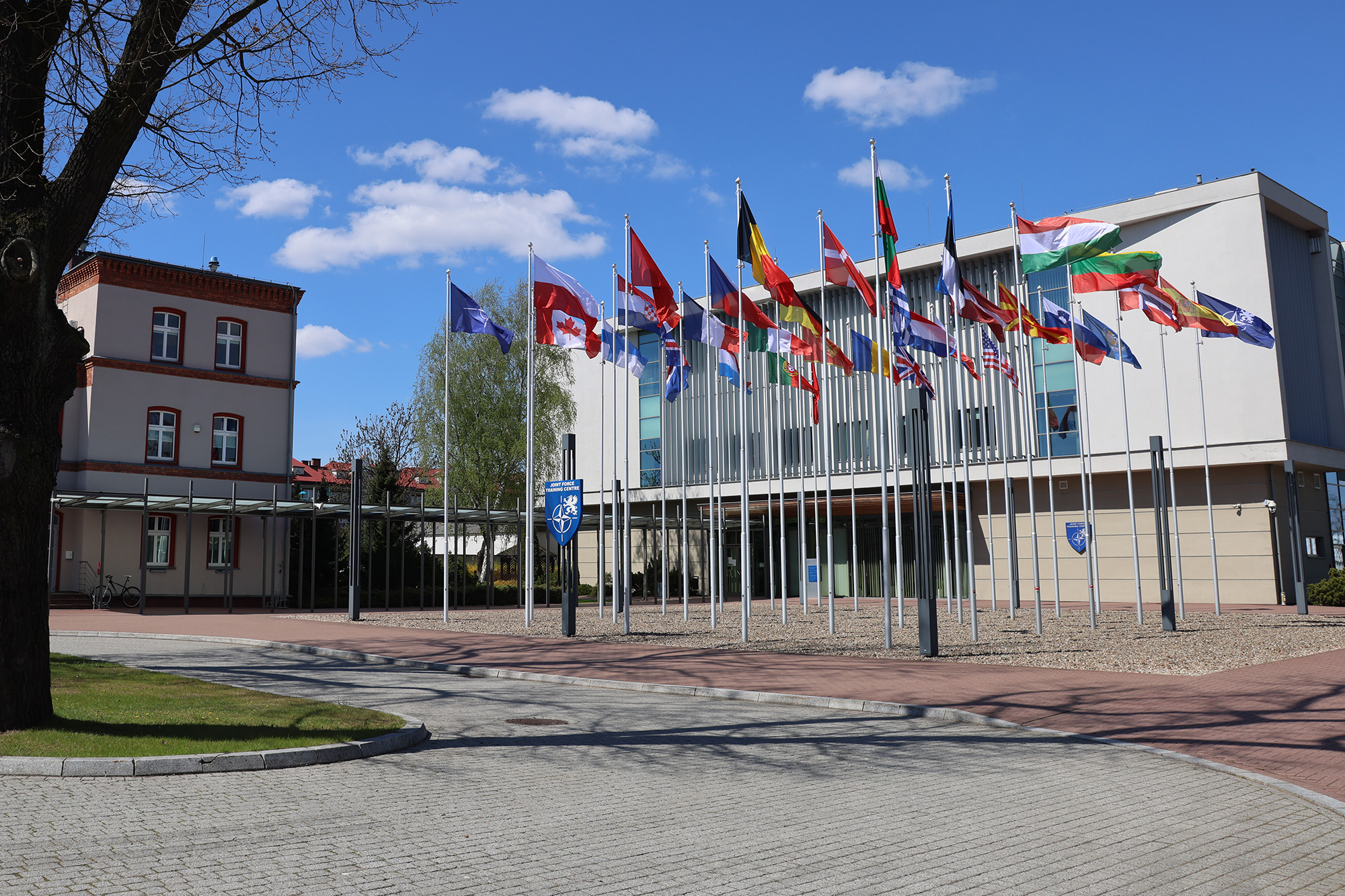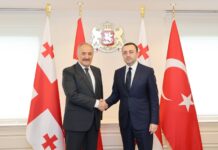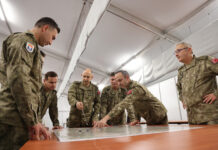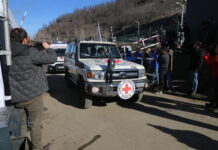As tensions continue to rise across the globe, it has never been more important for NATO member countries to ensure that their armed forces are properly trained and stand ready to defeat potential adversaries. This is NATO’s Joint Force Training Centre (JFTC), located in Bydgoszcz, Poland, principle objective.
JFTC’s state-of-the-art facility plays a key role in preparing Joint NATO forces for the challenges they will face while operating in all domains. In this article, we will take a closer look at this training centre and the role it plays in keeping Joint NATO forces mission ready.
JFTC is the only NATO training facility responsible for conducting joint military exercises and training at the tactical level. The only other NATO training facility, Joint Warfare Centre in Stavanger, Norway, focuses on the strategic and operational level. JFTC provides a challenging and comprehensive tactical level training environment for NATO military and non-military personnel. Furthermore, JFTC also conducts military experimentation and testing which supports the NATO warfighters’ effectiveness against today’s threats and prepares them for future threats.

Credit: JFTC
Background Information
The Centre’s history goes back to November 2002. During the NATO Prague Summit, Heads of State and Government opened a new chapter of the Alliance’s history. The Baltic States were invited to accession talks and they committed themselves to equipping NATO with new and advanced capabilities to better prepare for security threats of the 21st century.
One of the initiatives was the ambitious reorganisation of the NATO Command Structure. The overarching intent was to make it leaner, more effective and deployable, in order to ensure the full range of Alliance missions could be accomplished. Therefore, it was decided to develop two different four-star level strategic commands: one responsible for current NATO operations focused on how we fight today – Allied Command Operations (ACO) in Mons, Belgium, and the other to focus on NATO’s transformation, how we will fight in the future – Allied Command Transformation (ACT) in Norfolk, Virginia. Since one of NATO’s transformational objectives includes the continuous advancement of interoperable, network-enabled, combined joint forces, it was determined that investments, particularly in the area of integrated joint training, needed to be made. As a result, JFTC was established under the new Allied Command Transformation (ACT), along with Joint Warfare Centre (JWC) and Joint Analysis and Lesson Learned Centre (JALLC).
JFTC was officially formed on 31 March 2004 and conducted its Inauguration Ceremony on 25 June 2004. It was the first NATO Command Structure unit established in Central and Eastern Europe. The Centre paved the way for other NATO institutions to be established in the city of Bydgoszcz, which is now commonly referred to as “the NATO Capital of Poland”.
JFTC was initially established solely for the purpose of providing tactical level training to NATO forces. Over time, and as a consequence of the evolution of global security threats and NATO enlargement, JFTC’s mandate expanded to include experimentation and testing and quickly became a prominent and valuable member within the NATO network.
On 9 September 2009, JFTC moved into its new facility, equipped with modern communication and information systems. This enhanced the Centre’s capabilities and offered a one of a kind training facility, ready to support NATO current operations, future operations, emerging requirements, and tactical level certifications. JFTC’s critical contribution to the NATO training community makes it an essential player in maintaining readiness and operational effectiveness of the Alliance.
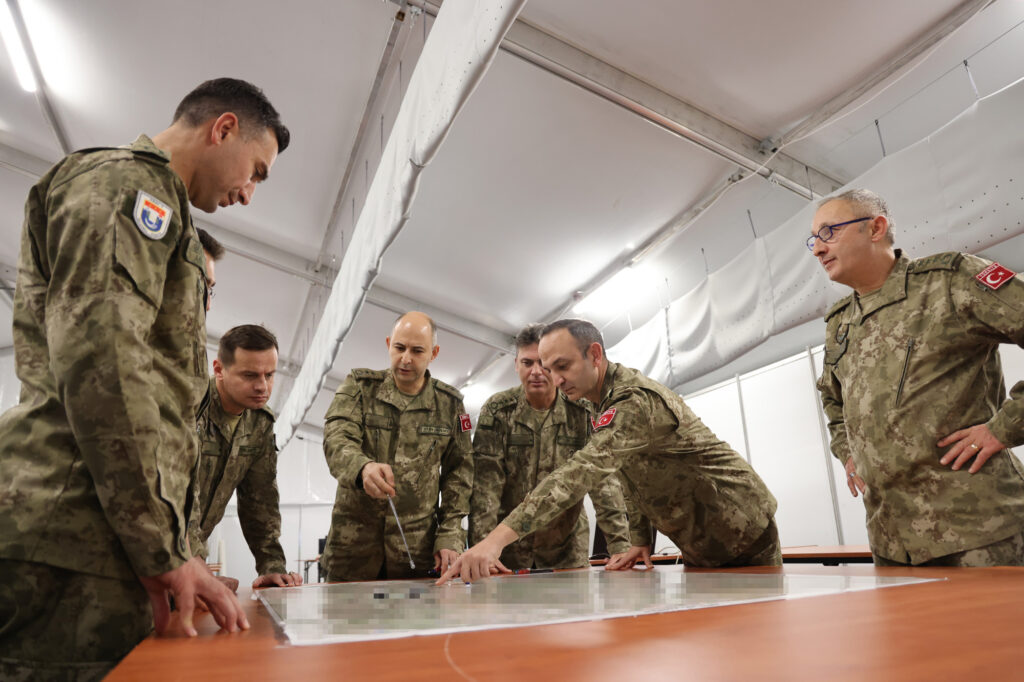
Credit: JFTC
Leadership & Structure
JFTC operates in a highly coordinated and structured manner to ensure that its missions are executed effectively. The Centre’s Commander is two-star General Officer. The command alternates between Germany and Poland, and currently, the position is filled by Major General Norbert Wagner of the German Armed Forces. The Commander is supported by a Deputy Commander and Chief of Staff. This position rotates between Czech Republic and Hungary, and is presently occupied by Brigadier General Petr Svoboda of the Czech Armed Forces.
The Centre consists of three divisions, each responsible for specific functions, supported by the Director of Management. The Director of Management (DOM) is responsible for managing the staff in all work requiring the attention of the Commander or Deputy Commander / Chief of Staff, coordinates administrative support, and information management. The Training and Exercise Division (TED) is responsible for the development, management, and execution all training and exercise evolutions. The Training and Exercise Enabling Division (TEED) is responsible for warfare development to include testing and experimentation. They also support preparation, execution, and assessment process of training and exercises. The Headquarters Support Division (HSD) is responsible for all logistical support for all programmes, training and exercise evolutions.
JFTC’s structure is composed of approximately 170 core positions, filled by soldiers and civilians, who possess the required knowledge and expertise necessary to meet a broad range of NATO training requirements. Additionally, JFTC is responsible for the NATO liaison team at the NATO-Georgia Joint Training and Evaluation Centre (JTEC) in Tbilisi, Georgia. JFTC’s team is comprised of representatives from 22 NATO nations (Belgium, Bulgaria, Canada, Czech Republic, Denmark, France, Germany, Greece, Hungary, Italy, Latvia, Lithuania, the Netherlands, North Macedonia, Norway, Poland, Portugal, Slovakia, Spain, Türkiye, the United Kingdom, and the United States), as well as one Partnership for Peace nation (Georgia).
Missions & Tasks
JFTC has three focused mission areas which promote NATO cohesiveness, resilience, and adaptability. The first mission area is support to Current Operations through the execution of NATO pre-deployment training. The second mission area is support to Future Operations through the execution of Major Joint Exercises (MJO+). The third mission area is support to Warfare Development through experimentation, capability integration testing, and promoting interoperability. The following paragraphs will go through each mission area in more detail.
Support to Current Operations
JFTC continuously builds on its vast experience, gained from previous NATO missions, in order to provide effective training to warfighting Headquarters and special advisors deploying in support of NATO Mission Iraq (NMI). The Centre ensures that trainees gain the necessary knowledge, flexibility, and capacity necessary to provide sound advice and assistance to their counterparts, while laying the groundwork for long-term sustainability.

Credit: JFTC
The pre-deployment training for NMI is conducted three times a year. It gathers future NMI staff members, advisors and subject matter experts, to include current NMI members, who facilitate the training. The training events consist of two phases. The first phase is one week and is conducted virtually. During this phase a series of briefings, individual learning modules, and live chats are conducted that enhances the participants’ understanding while increasing their basic level of knowledge about the mission and the operating environment. Phase two is a one week residential phase. It is executed at JFTC and the trainees develop the necessary skills that will prepare them to effectively operate in this challenging environment. This is done through the direct interaction with experts and team building events. For a majority of the participants, NMI pre-deployment training at JFTC is the first opportunity for them to meet their future comrades. Personal interactions help to establish a solid foundation for future cooperation and enables them to smoothly transition in theatre.
To date, JFTC has trained approximately 20,000 staff members and advisors for various NATO missions, including Iraq, Afghanistan, and Kosovo. Its extensive experience in delivering high-quality training has made JFTC a trusted and valued partner to NATO allied forces. JFTC’s training programmes are designed to prepare personnel for the challenges they will face in the real world and to enhance their readiness to support NATO missions.
Support to Future Operations
The Joint Force Training Centre holds a crucial position in NATO Command Structure and NATO Force Structure exercises. With its adaptable and flexible approach, the institution is ready to respond to the ever-changing training environment of the Alliance. It excels in delivering complex, high-intensity computer assisted exercises, serving as an Officer Conducting and/or Directing Exercise (OCE/ODE).
JFTC’s importance in the Alliance’s training programme is further highlighted by its key role in the LEDA exercise series as the Officer Directing the Exercise (ODE). The LEDA exercises bring together thousands of warfighters and non-military personnel from across NATO, with Exercise Control comprising 700-800 personnel, who control the exercise from JFTC in Bydgoszcz. The last edition of this series took place in 2022.
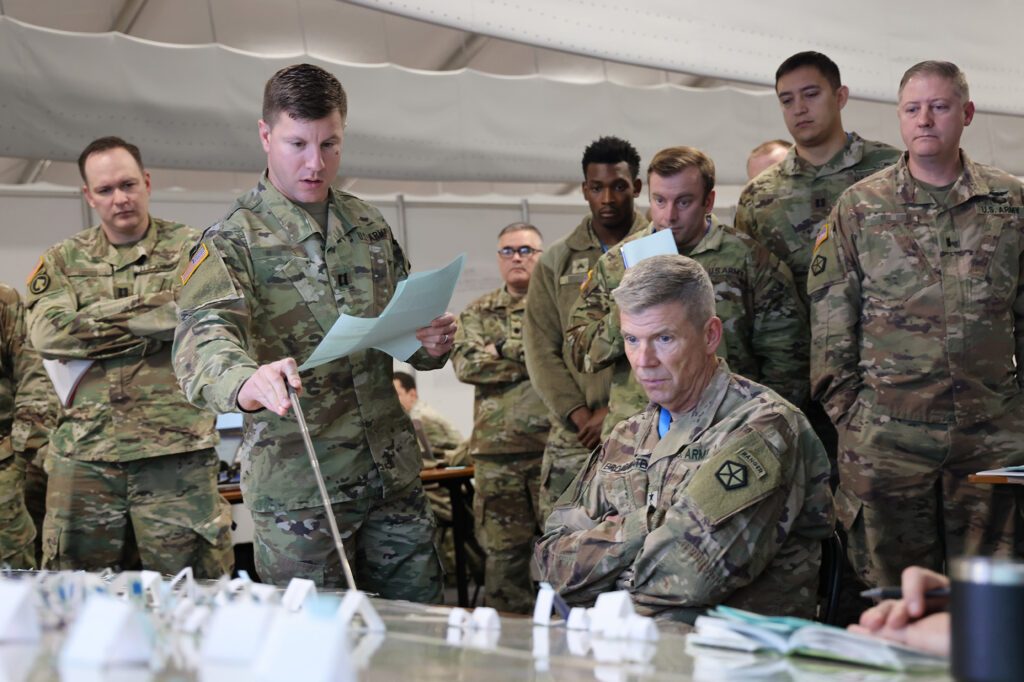
Credit: JFTC
LOYAL LEDA 2022, was a land domain tactical-level Computer Assisted Exercise / Command Post Exercise sponsored by NATO Allied Land Command. It was based on a robust Article 5 scenario that encompassed a wide range of modern warfare challenges, to include those deriving from space and cyber domains as well as hybrid warfare. The exercise was held at the end of 2022, after more than a year of meticulous planning, coordination, and preparation. JFTC, as the ODE, was responsible for the exercise that provided a venue for training, evaluation and certifying NATO Rapid Deployable Corps-Türkiye as the designated NATO Warfighting Corps for 2023.Moreover, LOLE22 trained Headquarters Multinational Corps South-East and Headquarters Multinational Division South-East in the planning and execution of an Article 5 Major Joint Operation against a peer adversary. The Centre was responsible for proper preparation and execution of the exercise and made sure all objectives were met. JFTC experts also contributed significantly to the experimentation activities of the exercise.
Additionally, JFTC serves as the OCE/ODE for the annual NATO Key Leader Training – Exercises STEADFAST PYRAMID AND PINNACLE (STPYPI), scheduled by the Supreme Headquarters Allied Powers Europe (SHAPE). This training programme offers an introduction to recently appointed NATO Flag and General Officers to the Alliance’s planning process, doctrine, and policy. The exercises are conducted at the Joint Headquarters of the Latvian National Armed Forces in Riga, where the Host Nation provides the venue for both events. NATO has conducted the STPYPI exercise series for 27 years and JFTC has been responsible for its preparation and execution since 2018.
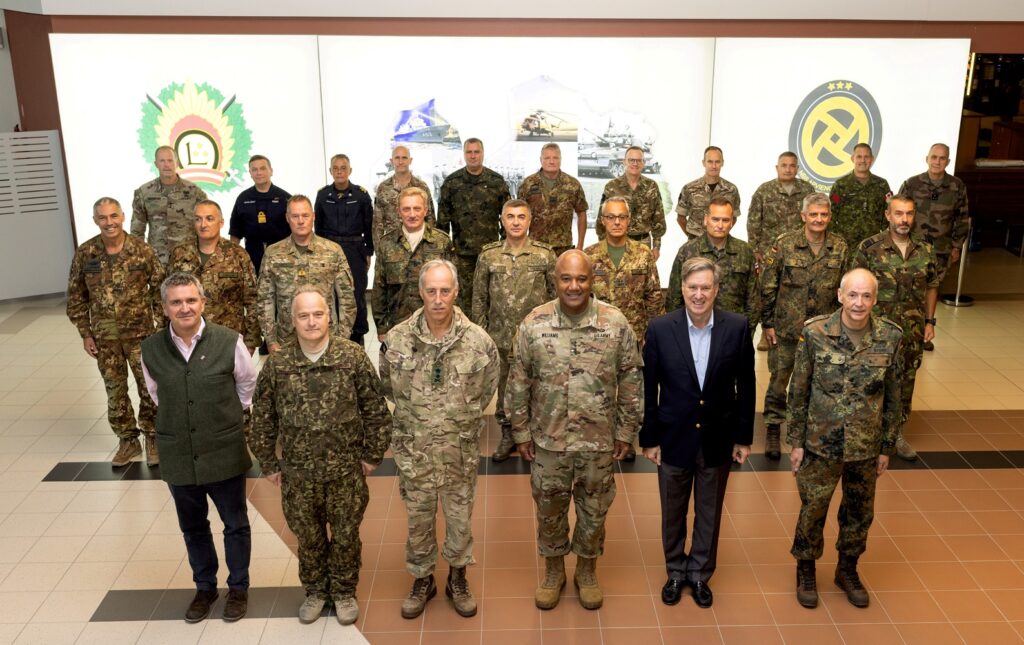
Credit: JFTC
The purpose is to train senior commanders and staff officers in the planning, preparation, and execution of joint operations through the application of informed decision-making, operational art, and the operational planning process. The attendees gain a better understanding of the context and connections associated with a comprehensive approach to a collective defence situation. Additionally, they actively interact with non-NATO organisations during the planning phase and learn how to effectively integrate them into their operations. Exercise STEADFAST PYRAMID is designed for senior staff officers who will support commanders during NATO operational planning and joint operations. Exercise STEADFAST PINNACLE, on the other hand, is intended for commanders selected to assume command within the NATO Command Structure (NCS) and NATO Force Structure (NFS).
JFTC provides NATO entities properly equipped facilities necessary to conduct tactical level exercises. Two such exercises were planned for this year: Exercise GRIFFIN LIGHTNING 2023, conducted in March by Multinational Corps Northeast, and Exercise CITADEL BONUS 2023, which will be executed by Rapid Reaction Corps France at the end of the year. JFTC is thus an essential training institution for the Alliance, providing a diverse range of training exercises and programmes which enhances the operational readiness of all NATO forces.
Contribution to Warfare Development
JFTC houses the only Battle Laboratory within NATO Allied Command Transformation (ACT) and possesses both the capacity and capability to promote Warfare Development based on Higher Headquarters direction and guidance.
The Centre provides support to ACT led Warfare Development Agenda (WDA) by concentrating at the joint tactical level via three Lines of Effort (LOE): Experimentation, Wargaming and Innovation. All LOE’s are interconnected within overarching strategic priorities, which includes Multi- Domain Operations (MDO) and adaptation to Deterrence and Defence of the Alliance (DDA).
JFTC hosts the Coalition Warrior Interoperability Exercise (CWIX), NATO’s largest annual interoperability testing event, which gathers more than 2,000 participants from 40 nations. During this event various agencies and organisations are able to collaborate, verify and validate the interoperability between various systems. This event attracts scientists, industry representatives, and military operators, from around the globe, and provides them an environment where they can explore, experiment and examine current and emerging capabilities. Additionally, it encourages innovation by identifying and addressing interoperability gaps, providing an opportunity to explore alternative approaches, and allows emerging technologies to be tested. Overall, CWIX is vital to ensuring NATO forces maintain the military advantage in an increasingly complex and uncertain global security environment.
Finally, to maximise the benefits from such events, JFTC will then link CWIX experimentation and testing to LEDA exercise series, in order to create an open continuum framework for the Alliance in order to further experimentation and testing for the benefit of NATO warfighters at the tactical level. For example, during Exercise LOYAL LEDA 2024, JFTC intends to execute six experimentation activities that range from discovery to hypothesis testing to validation.

Credit: JFTC
Support to JTEC
In 2015, JFTC took on the leading role in preparations for NATO-Georgia Exercise 2016, based on a non-Article 5 peacekeeping support operations scenario. After a successful execution of the event, the Centre used its experience in planning and delivering NATO training to mentor and support the newly established NATO-Georgia Joint Training and Evaluation Centre (JTEC). In 2019, JTEC directed the NATO-Georgia Exercise, and JFTC mentored them during the event. The outcome of that exercise confirmed JTEC’s capability to plan and deliver a multinational brigade level command post exercise and computer assisted exercise that met NATO standards.
In 2022, JFTC and its advisors at JTEC successfully completed another iteration of the NATO-Georgia Exercise. For the second time, JTEC, supported by JFTC, was the Officer Directing Exercise. JFTC mentors assisted all key positions in the Exercise Control (EXCON) structure in order to enhance interoperability as well as to share experience, skills and knowledge. The next NATO-Georgia Exercise will be held in 2025.
Summary
Over the years, cooperation between JFTC and NATO-Georgia JTEC has evolved and developed significantly – from mentorship to partnership. The Partnership Agreement between the two centres was officially signed on 11 December 2020.
At JFTC, we live by our motto, “Transformation Through Training”, and over nearly 20 years, JFTC has been instrumental in ensuring NATO forces are ready to deter and defend the Alliance against any adversary. By synthesising NATO training requirements with cutting-edge technology, state-of-the-art communication and information systems architecture and a responsive support capability, JFTC plays a critical role in the NATO transformation process.
As the geopolitical situation evolves so must NATO adapt. With the programme of work increasing year by year, JFTC aggressively organises both its workforce and infrastructure. JFTC is continuously adapting to the ever-changing realities and is ensuring they remained postured to provide the right training at the right time. In conclusion, whether through training or capability building, JFTC remains on the cutting edge of enhancing NATO’s ability to project stability, deter adversaries and defend the Alliance.
NATO Joint Force Training Centre, Office of Public Affairs


